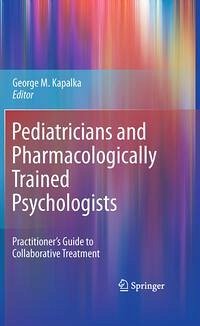Many factors affect treatment options for children and adolescents with mental health problems, including age, severity of symptoms, financial and time constraints, and access to qualified professionals. With the limitations of managed care plans and the shrinking pool of pediatric psychiatrists, the trend is toward pediatricians prescribing psychotropic medicines. Pharmacologically trained psychologists can offer valuable assistance to pediatricians caught in this predicament.
Tackling fundamental questions of when to treat as well as when and why to refer young patients, Pediatricians and Pharmacologically Trained Psychologists examines commonly occurring pediatric conditions requiring joint treatment; reviews theoretical models of consultation and collaboration; and spotlights professional issues typically arising from these team efforts.
With pertinent clarity and detail, this volume offers in-depth discussion in these key areas:
Pediatricians and Pharmacologically Trained Psychologists is a must-have reference for a broad range of researchers, professionals, and graduate students, including psychologists, pediatricians and other child mental health clinicians as well as nonphysician prescribers, such as nurses, physician assistants, and pharmacists.
Tackling fundamental questions of when to treat as well as when and why to refer young patients, Pediatricians and Pharmacologically Trained Psychologists examines commonly occurring pediatric conditions requiring joint treatment; reviews theoretical models of consultation and collaboration; and spotlights professional issues typically arising from these team efforts.
With pertinent clarity and detail, this volume offers in-depth discussion in these key areas:
- Collaborative treatment of mental health conditions, including mood, disruptive, anxiety, and eating disorders.
- Collaborative treatment of medical conditions, focusing on gastrointestinal disorders and diabetes.
- Changing clinical procedures in states that have enacted prescriptive authority for psychologists.
- Expanding roles for pharmacologically trained psychologists practicing in states that have not enacted prescriptive authority for psychologists.
- Medical psychology in the pediatric hospital.
- Integrative care in rural settings and on the reservation.
- The collaborative future: brain marker technology, training paradigms, and more.
Pediatricians and Pharmacologically Trained Psychologists is a must-have reference for a broad range of researchers, professionals, and graduate students, including psychologists, pediatricians and other child mental health clinicians as well as nonphysician prescribers, such as nurses, physician assistants, and pharmacists.
Dieser Download kann aus rechtlichen Gründen nur mit Rechnungsadresse in A, B, BG, CY, CZ, D, DK, EW, E, FIN, F, GR, HR, H, IRL, I, LT, L, LR, M, NL, PL, P, R, S, SLO, SK ausgeliefert werden.
From the reviews:
"This book details how pediatricians and psychologists who have training in psychopharmacology can collaborate to better understand and help children. ... The intended audience includes psychologists, pediatricians, and other child mental health clinicians as well as nonphysician prescribers such as nurses, physician assistants, and pharmacists. ... It is a book that every psychologist interested in prescriptive privileges should read." (Gary B. Kaniuk, Doody's Review Service, June, 2011)
"The book will primarily appeal to graduate students and practicing clinicians ... nurses, physician's assistants, and other mental health providers may also find the information accessible and directly applicable to their practice. The material in this text is well organized, making it an excellent reference book for clinicians who see clients presenting with diverse psychopathology. ... an excellent resource book for graduate students and clinicians that will have a broad level of appeal because of its applicability and timeliness in the field." (Lisa Fitzgibbons, PsycCRITIQUES, Vol. 57 (1), January, 2012)
"This book details how pediatricians and psychologists who have training in psychopharmacology can collaborate to better understand and help children. ... The intended audience includes psychologists, pediatricians, and other child mental health clinicians as well as nonphysician prescribers such as nurses, physician assistants, and pharmacists. ... It is a book that every psychologist interested in prescriptive privileges should read." (Gary B. Kaniuk, Doody's Review Service, June, 2011)
"The book will primarily appeal to graduate students and practicing clinicians ... nurses, physician's assistants, and other mental health providers may also find the information accessible and directly applicable to their practice. The material in this text is well organized, making it an excellent reference book for clinicians who see clients presenting with diverse psychopathology. ... an excellent resource book for graduate students and clinicians that will have a broad level of appeal because of its applicability and timeliness in the field." (Lisa Fitzgibbons, PsycCRITIQUES, Vol. 57 (1), January, 2012)









